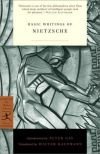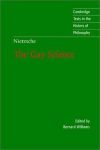
On the Genealogy of Morality: A Polemic is a 1887 book by German philosopher Friedrich Nietzsche. It consists of a preface and three interrelated essays that expand and follow through on doctrines Nietzsche sketched out in Beyond Good and Evil. The three Abhandlungen trace episodes in the evolution of moral concepts …

Twilight of the Idols, or, How to Philosophize with a Hammer is a book by Friedrich Nietzsche, written in 1888, and published in 1889.

The Will to Power is a book of notes drawn from the literary remains of philosopher Friedrich Nietzsche by his sister Elisabeth Förster-Nietzsche and Heinrich Köselitz. The Will to Power is also the title of a work that Nietzsche himself had considered writing. The work was first translated into English by Anthony M. …

'One must be superior to mankind in force, in loftiness of soul—in contempt’In these two devastating works, Nietzsche offers a sustained and often vitriolic attack on the morality and the beliefs of his time, in particular those of Hegel, Kant and Schopenhaur. Twilight of the Idols is a ‘grand declaration of war’ on …

A collection of Walter Kauffman's masterful translations of five of Nietzsche's greatest works: The Birth of Tragedy, which forever changed assumptions about Greek culture and the nature of tragedy; Beyond Good and Evil, as comprehensive an overview of Nietzsche's thought as the delightfully aphoristic Thus Spake …

Human, All Too Human: A Book for Free Spirits is a book by 19th century philosopher Friedrich Nietzsche, originally published in 1878. A second part, Assorted Opinions and Maxims, was published in 1879, and a third part, The Wanderer and his Shadow, followed in 1880. The book is Nietzsche's first in the aphoristic …

The Birth of Tragedy from the Spirit of Music is an 1872 work of dramatic theory by the German philosopher Friedrich Nietzsche. It was reissued in 1886 as The Birth of Tragedy, Or: Hellenism and Pessimism. The later edition contained a prefatory essay, An Attempt at Self-Criticism, wherein Nietzsche commented on this …

In late 1888, only weeks before his final collapse into madness, Nietzsche (1844-1900) set out to compose his autobiography, and Ecce Homo remains one of the most intriguing yet bizarre examples of the genre ever written. In this extraordinary work Nietzsche traces his life, work and development as a philosopher, …

The Gay Science is a book by Friedrich Nietzsche, first published in 1882 and followed by a second edition, which was published after the completion of Thus Spoke Zarathustra and Beyond Good and Evil, in 1887. This substantial expansion includes a fifth book and an appendix of songs. It was noted by Nietzsche to be …

 English
English Español
Español Deutsch
Deutsch
